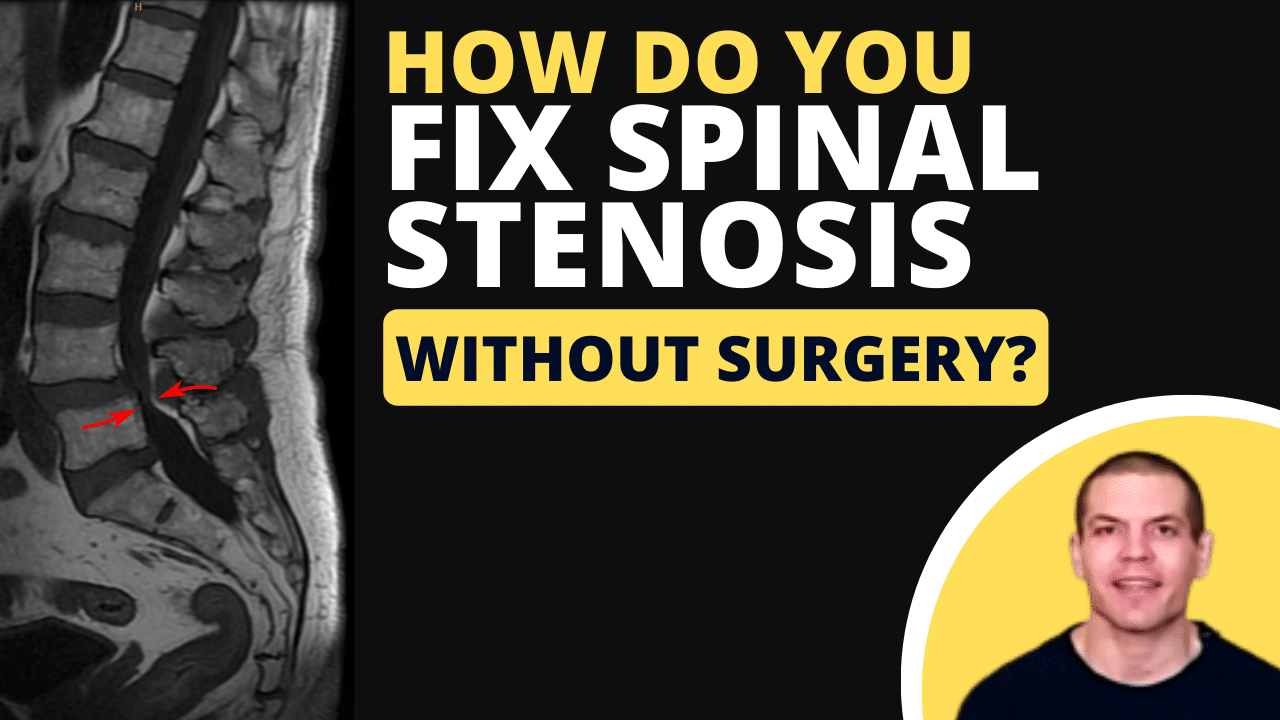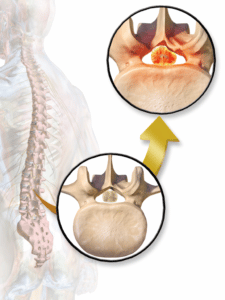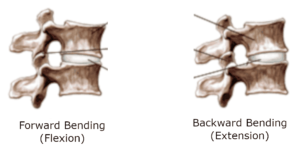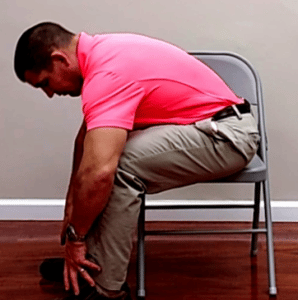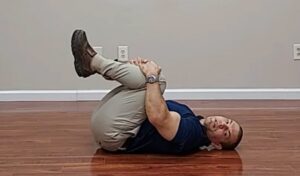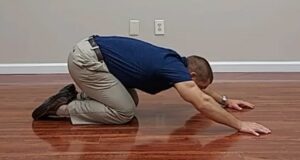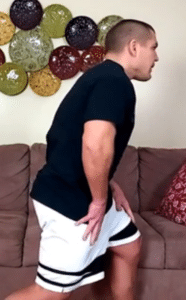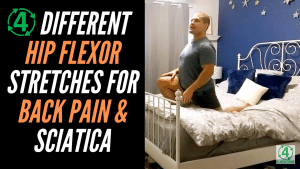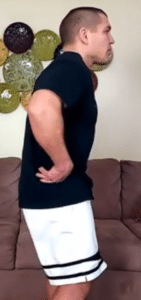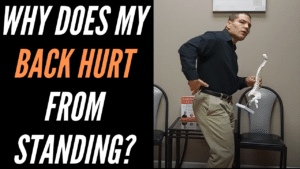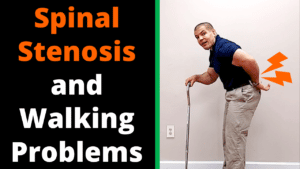Hoping To Avoid Surgery For Spinal Stenosis?
Watch the video to learn 5 exercises that you can use to fix spinal stenosis symptoms without surgery.
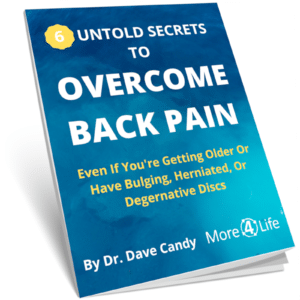
What is Spinal Stenosis?
Spinal stenosis basically means a narrowing of the spaces in your spine where the nerves run.
That can happen either in the neck or in the back. However, in this post I'm going to discuss how you can relieve lumbar spinal stenosis (spinal stenosis in your lower back).
Types of Spinal Stenosis
There are two different types of spinal stenosis you can have:
- Central canal stenosis - narrowing of the space where your spinal cord runs down the center of your spine.
- Lateral stenosis or foraminal stenosis - narrowing of the spaces where the nerve roots exit on either side of the spine.
In either of those cases, bending backwards narrows the spaces where the nerves come out on the side of the spine. It also kind of kinks the spinal cord in the canal.
Usually, bending backwards or standing straight up tall makes spinal stenosis symptoms worse.
That's why you often see people with spinal stenosis walking hunched over.... because doing so opens up the spaces where the nerve roots come out as well as the space in the center of the canal where the spinal cord runs.
That doesn't necessarily mean that you'll have to walk hunched over though.
There are a few tips that I'll discuss later that will help you to walk a little bit more upright. But that's the reason why people tend to walk bent over if they have spinal stenosis.
Exercises for Relieving Spinal Stenosis Symptoms
So what exercises can you use to relieve spinal stenosis symptoms?
Well, those exercises largely fall into two different categories:
- Exercises to do when you're having an acute bout of symptoms
- Exercises that don't necessarily relieve the pain right away, but they help fix spinal stenosis symptoms on more of a long-term basis.
Exercises To Immediately Fix Spinal Stenosis Symptoms
So what exercises should you to do if you're having spinal stenosis symptoms?
Usually, that's pain in your back but even more so pain that radiates down the leg, particularly when you're standing or when you're walking.
Well, the immediate fix for spinal stenosis symptoms is leaning forwards. Often, bending forwards helps even more.
Therefore, any type of forward bending stretch is the best immediate fix for spinal stenosis.
You can do either standing or sitting forward bending.
Either way, forward bending opens up the spaces on the side of your spine as well as makes the spinal canal functionally larger when you bend forward.
That often will relieve symptoms very quickly when you have spinal stenosis.
However, if you're having a really, really bad bout of spinal stenosis, sometimes even doing forward bending won't the pain.
That's because you're still upright. Gravity is still pressing down on you, and you still have to activate the muscles in your lower back.
Knees To Chest Exercise
So the best way to relieve spinal stenosis if it's really, really bothering you is to lay down and then just bring both knees up towards your chest.
That way, you're not bearing weight, gravity is not pushing down on you, and you.
This still brings your spine into relative flexion, or a forward bent position. However instead of bending your chest toward your knees, you're just bending your knees toward your chest.
Child's Pose
Additionally, if you are able to kneel on your knees, doing a child's pose (prayer stretch), where you kneel on all four's an rock back is another really good stretch to relieve spinal stenosis symptoms.
Overall, that's one of my favorite exercises for lower back pain.
However, for people who have spinal stenosis, sometimes you might have trouble getting on or off the floor.
You can also do this exercise on a bed or couch.
However, many people with spinal stenosis also have knee arthritis.
So although child's pose is a really good stretch, if you can't do it comfortably because of your knees, doing a seated forward bending stretch or laying and pulling your knees up to your chest are good exercises to quickly fix spinal stenosis symptoms in the short-term.
Exercises To Fix Spinal Stenosis Without Surgery
Although the exercises above usually relieve spinal stenosis symptoms quickly, the bad thing about them is that they don't necessarily fix the long-term problem.
So, they're good if you're just needing some symptomatic relief for the moment.
However, they don't necessarily fix spinal stenosis per se.
So, what can you do to get more of a lasting fix for spinal stenosis?
Well, that has to do with decreasing how much trouble you're having with standing and walking. That's usually the most common symptom that people with spinal stenosis have - they have problems walking and standing for long periods.
If you're standing with a lot of arch in your back, that makes spinal stenosis symptoms worse.
One thing that people do with spinal stenosis is they lean forward. That flattens out the curve in your back.
However, if you have tight hip flexors, then they pull you forward and in order to stand upright, you have to arch your back.
Again, arching your back backwards narrows the spaces where your nerves come out. It kind of kinks the spinal cord in the spinal canal.
Hip Flexor Stretches
Therefore, if you can stretch your hip flexors that can help reduce the amount that you need to arch your back in order to stand upright.
You can stretch your hip flexors by putting one leg in back, one leg in front.
Then roll your pelvis under while keeping your spine fairly flat.
That means that you may need to lean forward a little bit.
Now, if you're having an immediate bout of spinal stenosis, this stretch won't relieve it.
In fact, it might actually make it feel worse if you're in the heat of a flare-up.
So, I wouldn't recommend stretching your hip flexors when you're hurting.
However, if you do it when you're not hurting, that can help prevent you from hurting as quickly when you are standing and walking in the future.
Learn 4 ways to stretch your hip flexors here.
Standing Pelvic Tilt
The other thing that you can do to help flatten the curve in your back is to intentionally do so you're standing.
Instead of standing with a lot of back arch, practice doing a little pelvic tilt exercise where you roll your pelvis underneath of you to flatten the curve out in your back.
You can do that whether you're cooking in the kitchen or doing chores or standing in line at the grocery store, and whatever you happen to be doing.
If you're standing still, then rolling your pelvis underneath and standing like that is a good stretch to help reduce the amount of curve you have in your back.
That'll help fix spinal stenosis pain when you're standing still.
Is Walking Good For Spinal Stenosis?
Even though walking is one of the things that people with spinal stenosis have the most trouble doing, walking is a really great exercise for spinal stenosis up to the point that you start to have symptoms.
I made another video about walking problems with spinal stenosis, that I'd suggest you watch for more tips on how to walk more comfortably.
How To Fix Spinal Stenosis Without Surgery
Now beyond that, if you are hoping to fix spinal stenosis without surgery, I would recommend seeing a physical therapist who specializes in treating people with chronic back problems such as spinal stenosis.
We do that here at More 4 Life. We help people with spinal stenosis to be able to stand longer and walk farther without being limited by back and leg pain.
If you'd like to get relief from spinal stenosis without surgery, the tap the button below to request an appointment with one of our specialists, and we'd be happy to help.

